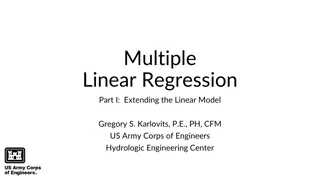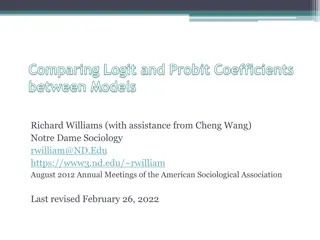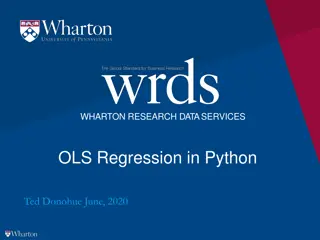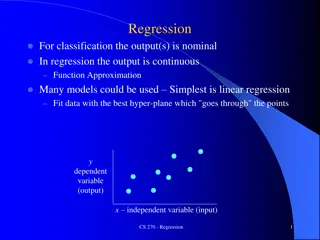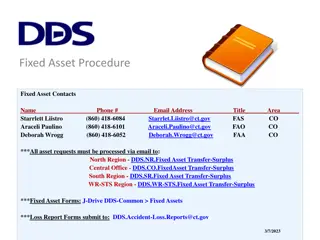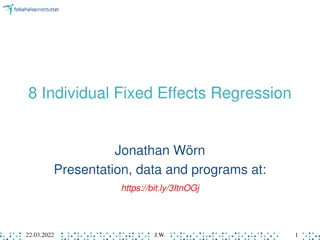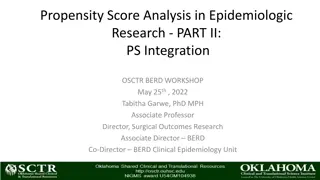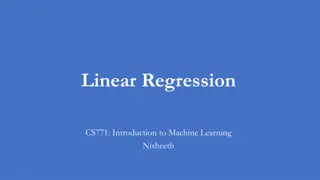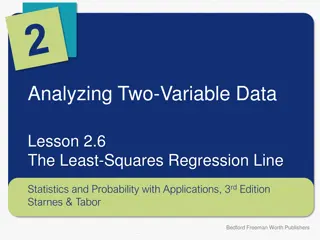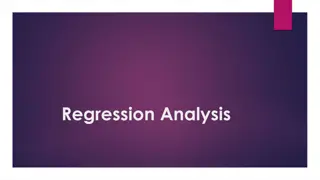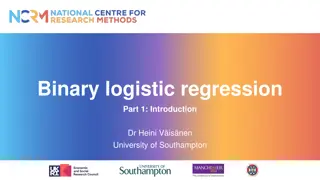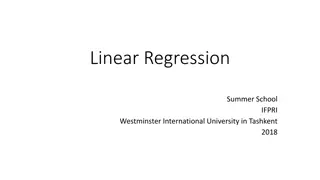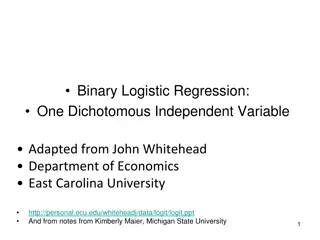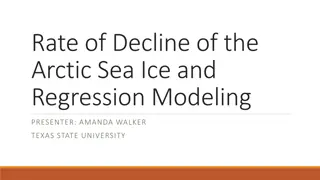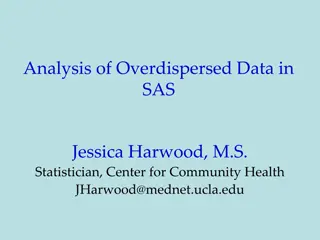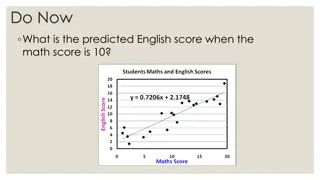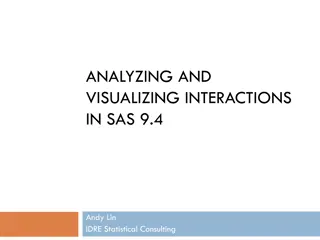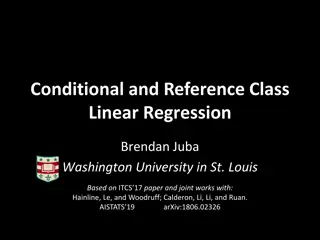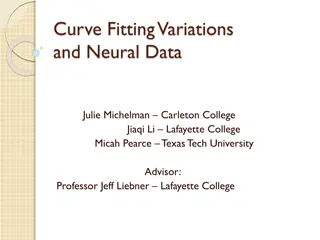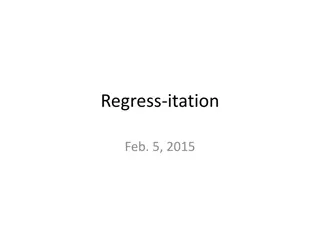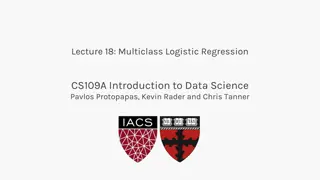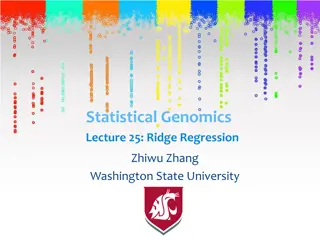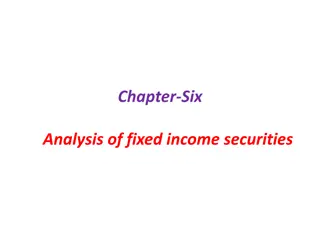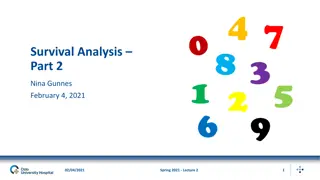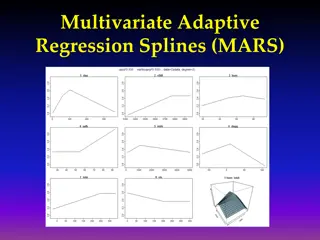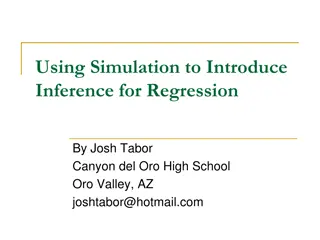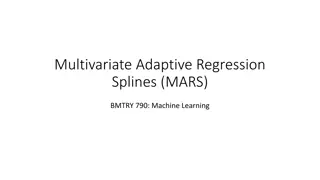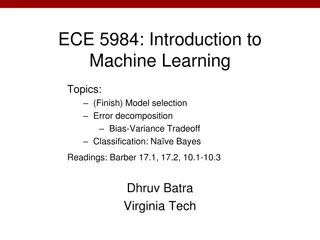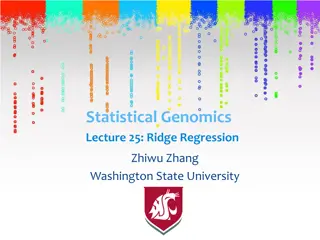Understanding Dummy Variables in Regression Analysis
Dummy variables are essential in regression analysis to quantify qualitative variables that influence the dependent variable. They represent attributes like gender, education level, or region with binary values (0 or 1). Econometricians use dummy variables as proxies for unmeasurable factors. These
2 views • 19 slides
Understanding Machine Learning Concepts: Linear Classification and Logistic Regression
Explore the fundamentals of machine learning through concepts such as Deterministic Learning, Linear Classification, and Logistic Regression. Gain insights on linear hyperplanes, margin computation, and the uniqueness of functions found in logistic regression. Enhance your understanding of these key
6 views • 62 slides
Understanding Multiple Linear Regression: An In-Depth Exploration
Explore the concept of multiple linear regression, extending the linear model to predict values of variable A given values of variables B and C. Learn about the necessity and advantages of multiple regression, the geometry of best fit when moving from one to two predictors, the full regression equat
4 views • 31 slides
Understanding Multicollinearity in Regression Analysis
Multicollinearity in regression occurs when independent variables have strong correlations, impacting coefficient estimation. Perfect multicollinearity leads to regression model issues, while imperfect multicollinearity affects coefficient estimation. Detection methods and consequences, such as incr
1 views • 11 slides
Comparing Logit and Probit Coefficients between Models
Richard Williams, with assistance from Cheng Wang, discusses the comparison of logit and probit coefficients in regression models. The essence of estimating models with continuous independent variables is explored, emphasizing the impact of adding explanatory variables on explained and residual vari
1 views • 43 slides
Binary Logistic Regression with SPSS – A Comprehensive Guide by Karl L. Wuensch
Explore the world of Binary Logistic Regression with SPSS through an instructional document provided by Karl L. Wuensch of East Carolina University. Understand when to use this regression model, its applications in research involving dichotomous variables, and the iterative maximum likelihood proced
0 views • 87 slides
WHARTON RESEARCH DATA SERVICES OLS Regression in Python
This tutorial covers OLS regression in Python using Wharton Research Data Services. It includes steps to install required packages, read data into Python, fit a model, and output the results. The guide also demonstrates activating a virtual environment, installing necessary packages, and fitting a r
0 views • 14 slides
Understanding Regression in Machine Learning
Regression in machine learning involves fitting data with the best hyper-plane to approximate a continuous output, contrasting with classification where the output is nominal. Linear regression is a common technique for this purpose, aiming to minimize the sum of squared residues. The process involv
1 views • 34 slides
Understanding Lipids: Waxes, Fats, and Fixed Oils
Lipids are organic compounds like waxes, fats, and fixed oils found in plants and animals. Fixed oils are reserve food materials, while fats are solid at higher temperatures. These substances are esters of glycerol and fatty acids, with various components giving them unique properties and flavors. C
0 views • 20 slides
Fixed Asset Management Procedures and Contacts Overview
This document provides an overview of fixed asset management procedures, contacts, categories, and responsibilities within the State of Connecticut. It covers the definition of fixed assets, capital vs. controllable equipment, receiving new assets, inventory audits, asset management responsibilities
0 views • 15 slides
Understanding Fixed Effects Regression for Causal Inference in Social Research
Explore the concept of fixed effects regression for obtaining causal estimates with observational data, focusing on the association between social participation and depressive symptoms. Discover how this method controls for time-invariant factors and eliminates confounding variables, providing a clo
0 views • 49 slides
Integration Approaches of Propensity Scores in Epidemiologic Research
Propensity scores play a crucial role in epidemiologic research by helping address confounding variables. They can be integrated into analysis in various ways, such as through regression adjustment, stratification, matching, and inverse probability of treatment weights. Each integration approach has
0 views • 20 slides
Understanding Multiple Regression in Statistics
Introduction to multiple regression, including when to use it, how it extends simple linear regression, and practical applications. Explore the relationships between multiple independent variables and a dependent variable, with examples and motivations for using multiple regression models in data an
0 views • 19 slides
Overview of Linear Regression in Machine Learning
Linear regression is a fundamental concept in machine learning where a line or plane is fitted to a set of points to model the input-output relationship. It discusses fitting linear models, transforming inputs for nonlinear relationships, and parameter estimation via calculus. The simplest linear re
0 views • 14 slides
Introduction to Lipid Biosynthesis and Fixed Oils in Pharmacognosy Lecture
In this lecture by Asst. Prof. Dr. Ibrahim Salih, the focus is on lipid biosynthesis, specifically the three phases involved: glycerol formation, fatty acid biosynthesis, and triglyceride production. The classification of fixed oils into drying, semi-drying, and non-drying categories based on their
0 views • 13 slides
Understanding Least-Squares Regression Line in Statistics
The concept of the least-squares regression line is crucial in statistics for predicting values based on two-variable data. This regression line minimizes the sum of squared residuals, aiming to make predicted values as close as possible to actual values. By calculating the regression line using tec
0 views • 15 slides
Understanding Regression Analysis: Meaning, Uses, and Applications
Regression analysis is a statistical tool developed by Sir Francis Galton to measure the relationship between variables. It helps predict unknown values based on known values, estimate errors, and determine correlations. Regression lines and equations are essential components of regression analysis,
0 views • 10 slides
Introduction to Binary Logistic Regression: A Comprehensive Guide
Binary logistic regression is a valuable tool for studying relationships between categorical variables, such as disease presence, voting intentions, and Likert-scale responses. Unlike linear regression, binary logistic regression ensures predicted values lie between 0 and 1, making it suitable for m
7 views • 17 slides
Understanding Linear Regression: Concepts and Applications
Linear regression is a statistical method for modeling the relationship between a dependent variable and one or more independent variables. It involves estimating and predicting the expected values of the dependent variable based on the known values of the independent variables. Terminology and nota
0 views • 30 slides
Understanding Binary Logistic Regression and Its Importance in Research
Binary logistic regression is an essential statistical technique used in research when the dependent variable is dichotomous, such as yes/no outcomes. It overcomes limitations of linear regression, especially when dealing with non-normally distributed variables. Logistic regression is crucial for an
0 views • 20 slides
Arctic Sea Ice Regression Modeling & Rate of Decline
Explore the rate of decline of Arctic sea ice through regression modeling techniques. The presentation covers variables, linear regression, interpretation of scatterplots and residual plots, quadratic regression, and the comparison of models. Discover the decreasing trend in Arctic sea ice extent si
1 views • 9 slides
Understanding Overdispersed Data in SAS for Regression Analysis
Explore the concept of overdispersion in count and binary data, its causes, consequences, and how to account for it in regression analysis using SAS. Learn about Poisson and binomial distributions, along with common techniques like Poisson regression and logistic regression. Gain insights into handl
0 views • 61 slides
Understanding Regression Lines for Predicting English Scores
Learn how to utilize regression lines to predict English scores based on math scores, recognize the dangers of extrapolation, calculate and interpret residuals, and understand the significance of slope and y-intercept in regression analysis. Explore the process of making predictions using regression
0 views • 34 slides
Understanding Interaction Effects in Regression Analysis using SAS 9.4
Regression models help analyze effects of independent variables (IVs) on dependent variables (DVs, like weight loss from exercise time). Interactions explore how one IV's effect can be modified by another IV (moderating variable, MV). In this seminar's purpose, techniques to estimate, test, and grap
0 views • 137 slides
Conditional and Reference Class Linear Regression: A Comprehensive Overview
In this comprehensive presentation, the concept of conditional and reference class linear regression is explored in depth, elucidating key aspects such as determining relevant data for inference, solving for k-DNF conditions on Boolean and real attributes, and developing algorithms for conditional l
0 views • 33 slides
Exploring Curve Fitting and Regression Techniques in Neural Data Analysis
Delve into the world of curve fitting and regression analyses applied to neural data, including topics such as simple linear regression, polynomial regression, spline methods, and strategies for balancing fit and smoothness. Learn about variations in fitting models and the challenges of underfitting
0 views • 33 slides
Understanding Linear Regression and Gradient Descent
Linear regression is about predicting continuous values, while logistic regression deals with discrete predictions. Gradient descent is a widely used optimization technique in machine learning. To predict commute times for new individuals based on data, we can use linear regression assuming a linear
0 views • 30 slides
Understanding Multiclass Logistic Regression in Data Science
Multiclass logistic regression extends standard logistic regression to predict outcomes with more than two categories. It includes ordinal logistic regression for hierarchical categories and multinomial logistic regression for non-ordered categories. By fitting separate models for each category, suc
0 views • 23 slides
Understanding Ridge Regression in Genomic Selection
Explore the concept of ridge regression in genomic selection, involving the development of genomic selection methods, pioneers in implementation, fixed and random effects, and the over-fitting phenomenon. Learn how ridge regression addresses issues of over-fitting by introducing regularization param
0 views • 26 slides
Methods for Handling Collinearity in Linear Regression
Linear regression can face issues such as overfitting, poor generalizability, and collinearity when dealing with multiple predictors. Collinearity, where predictors are linearly related, can lead to unstable model estimates. To address this, penalized regression methods like Ridge and Elastic Net ca
0 views • 70 slides
Understanding Fixed Income Securities: Bonds Overview
Learn about fixed income securities in week 2 of the Fundamentals of Investment course, focusing on bond characteristics, types, and risks. Bonds are vital debt instruments issued by organizations to raise funds, with features like fixed maturity dates and interest rates. Explore various bond types
0 views • 20 slides
Understanding Fixed-Income Securities for Investment
Fixed-income securities offer fixed returns up to a redemption date or indefinitely, comprising long-term debt securities and preferred stocks. These investments involve various risk factors, including default risk. Long-term debt securities, such as bonds, provide a safe asset but require careful c
0 views • 47 slides
Understanding Linear Regression Analysis: Testing for Association Between X and Y Variables
The provided images and text explain the process of testing for association between two quantitative variables using Linear Regression Analysis. It covers topics such as estimating slopes for Least Squares Regression lines, understanding residuals, conducting T-Tests for population regression lines,
0 views • 26 slides
Data Analysis and Regression Quiz Overview
This quiz covers topics related to traditional OLS regression problems, generalized regression characteristics, JMP options, penalty methods in Elastic Net, AIC vs. BIC, GINI impurity in decision trees, and more. Test your knowledge and understanding of key concepts in data analysis and regression t
0 views • 14 slides
Understanding Survival Analysis: Hazard Function and Cox Regression
Survival analysis examines hazards, such as the risk of events occurring over time. The Hazard Function and Cox Regression are essential concepts in this field. The Hazard Function assesses the risk of an event in a short time interval, while Cox Regression, named after Sir David Cox, estimates the
0 views • 20 slides
Understanding Multivariate Adaptive Regression Splines (MARS)
Multivariate Adaptive Regression Splines (MARS) is a flexible modeling technique that constructs complex relationships using a set of basis functions chosen from a library. The basis functions are selected through a combination of forward selection and backward elimination processes to build a smoot
0 views • 13 slides
Exploring Seating Location Impact on Grades through Regression Inference
Using simulations to introduce inference for regression, this study investigates if seat location affects student grades in a classroom setting. Randomly assigned seating data is analyzed to determine the impact of seat proximity on test scores, exploring potential explanations for observed associat
0 views • 20 slides
Multivariate Adaptive Regression Splines (MARS) in Machine Learning
Multivariate Adaptive Regression Splines (MARS) offer a flexible approach in machine learning by combining features of linear regression, non-linear regression, and basis expansions. Unlike traditional models, MARS makes no assumptions about the underlying functional relationship, leading to improve
0 views • 42 slides
Introduction to Machine Learning: Model Selection and Error Decomposition
This course covers topics such as model selection, error decomposition, bias-variance tradeoff, and classification using Naive Bayes. Students are required to implement linear regression, Naive Bayes, and logistic regression for homework. Important administrative information about deadlines, mid-ter
0 views • 42 slides
Concept Development and Implementation of Ridge Regression in Genomic Selection
This presentation delves into the concept development and implementation of ridge regression in genomic selection, emphasizing the importance of avoiding overfitting by regulating parameters and distinguishing between fixed and random effects. The pioneers of ridge regression and Bayesian methods ar
0 views • 26 slides


